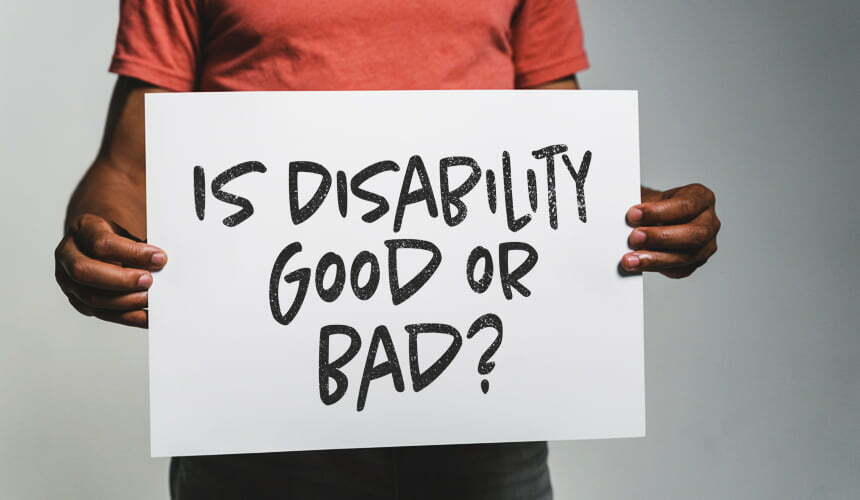

What side of the fence do you land on? Is disability a positive or a negative? Is disability good or bad (evil)? Is disability a blessing or a curse?
Many have argued this age-old conundrum. Most have sided with disability being negative, bad, evil, or a curse. Even the disciples of Jesus fell on this side of the fence. Look no further than their discourse with Jesus in John chapter nine.
Religious leaders would argue theologically that disability could not be positive because Jesus focused most of his miraculous healings on people with disabilities. Why would Jesus cure someone of their disabling condition if it was positive, good, or a blessing?
The minority in this dispute would say site Psalm 139 saying that everyone is fearfully and wonderfully made therefore disability must be a positive, good, or a blessing. Next, they would look to Exodus chapter four where the Lord communicates to Moses that He is the author of his disability. Finally, they would point to Colossians 1:16 and the fact that all things were created by God for and for God and declared to be good and not evil.
The majority would fire back that sin has sent the cosmos spinning out of control and that disability is evidence of the brokenness of the world. Or they would take the stance that God does not create disability but rather allows it to happen because of the sin-tainted existence of the fallen human race referencing the Book of Job.
This debate feels like a never-ending ping pong match. Watching people take sides and lob disagreements over the net like missiles is exhausting.
What if this argument was not meant to be an either-or equation? What if there was another answer or possibility?
Consider these alternatives to the good or evil debate and make your conclusion.
Scientists have long studied DNA and what genes cause different traits to become dominant or recessive. From your genetic makeup, you can identify where hair color, eye color, height, etc. come from. Hair color, eye color, height are personal traits or things that make you, you. They are not positive or negative regardless of the societal norms or narratives that are assigned to them. They are not suboptimal mutations or mistakes that result from sin and brokenness but rather part of the regular makeup of human beings.
Personal traits, including disability, should not be categorized as positive or negative. When sides are taken people become objectified. When people become objectified dangerous things happen.
Down syndrome would fall into this category. It can be traced back to an extra full or partial copy of chromosome 21. While societal norms and narratives have influenced upwards of 90% of infants pre-screened positive for Down syndrome to be aborted they should not be considered as the judge and jury. People with Down syndrome are not less human than others, on the contrary, they are scientifically more human because of the presence of an additional chromosome.
For people with disability as a character trait self-advocacy becomes a necessity to fight back the negative societal norms and narratives. Society would dictate that their lives are somehow lesser than others and ultimately not worth living.
This message is something that Frank Stevens fought hard against. He declared passionately to the United States Congress in 2017, “I am a man with Down syndrome and my life is worth living.” For his entire testimony:
If the viewpoint on disability is adapted it answers the question “Why did Jesus not heal everyone with a disability?”
It is answered because not all view their disability as negative, bad, evil, or a curse. Some embrace this personal trait as part of their identity as they reject societal norms and narratives like Frank Stevens.
Sure Jesus did heal many with disabilities. This could be the case for many reasons.
This viewpoint also fits with the Psalm 139 and Exodus chapter four argument. It is just another part of the wonderful creation of God. The ability of man to fully explain or understand all sides of this viewpoint is not a necessity.
Another option that can stand alone or build upon the previous viewpoint is the following.
Not all people are born with a personal trait that manifests itself in an identified disability. That however does not mean that people not born with the trait are immune from it. In fact, for the vast majority of people that live long enough acquiring a disability as a result of aging is the normative experience. Disability is inevitable and likely to be experienced by nearly all people. For some, it is sooner than later when disability is acquired through an accident or incident.
Disability as understood from this viewpoint is neither a positive nor a negative but rather a normative part of the human condition.
God created the soul that resides within the human body to be eternal, not the flesh and blood of the body. Paul speaks of this condition in 2 Corinthians 4:16 when he writes, “So we do not lose heart. Though our outer self is wasting away, our inner self is being renewed day by day.” The outer self is the body that is subject to disabling conditions as the result of aging, accidents, or other incidents over time. The inner self is the soul that is eternal and not subject to disabling conditions.
The outer self, the body, returning to the dust from which it was formed is inevitable. This truth was declared by God from the beginning of time in Genesis 3:19. “By the sweat of your face you shall eat bread, till you return to the ground, for out of it you were taken; for you are dust, and to dust you shall return.” Returning to dust is not a glorious process. Returning to dust is all about experiencing the breakdown of the outer self, the body.
Paul understood the existing negative societal norms and narratives that exist around disability. That is why he reminds people to not lose heart as he points people to the eternal, the inner self. It is easy to become discouraged when one loses the ability that they once possessed. But in the light of eternity, this is a passing thing that helps to renew and prepare our hearts for our greater purpose and our eternal destination.
Paul again drives this truth home in Romans 8:18, “For I consider that the sufferings of this present time are not worth comparing with the glory that is to be revealed to us.”
God desires that people not focus on or even believe in the lies of society surrounding disability. These negative narratives are a distraction from the eternal purpose of God who desires to draw closer to us both now and forever. In the process of returning to dust, people should celebrate that each day they draw closer to being united with their creator.
Viewing disability as an inevitable and normative part of the human experience removes the negative connotations and answers the question as to why Jesus would not find it necessary to heal all people with disabilities.
Do you see disability as a positive or a negative? Good or bad (evil)? A blessing or a curse? Or have you decided to leave the fence behind and move over to a new playing field where disability is not one of two sides of a polar argument? Are you open to accepting that disability is just another possible personal trait and/or an inevitable and normative part of the human experience? Or is there yet another alternative?


